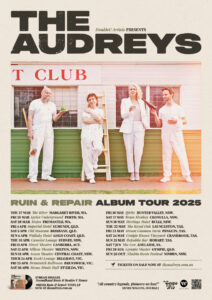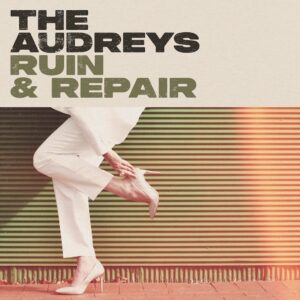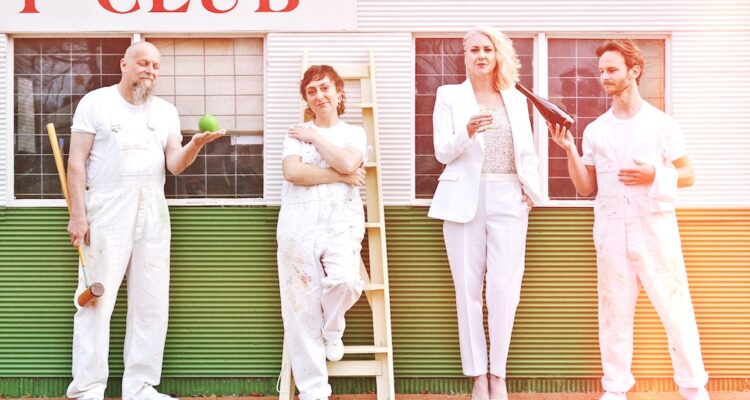After a long break, Ruin & Repair marks your first full-length album in several years. How did the creative process differ this time around compared to your previous albums, and what were some key moments that shaped this record?
All of my albums, even my solo album from 2016, were born out of a collaboration between myself and Tristan. Tristan Goodall was my best friend and songwriting partner for over 20 years, and the person who first convinced me I could even BE a songwriter. We wrote songs together, stood on stage together night after night, spent hours in cars and airports and green rooms together, watched late night info-mercials in hotel rooms together. He was such a huge part of my life and I missed him so much that making a record without him felt impossible. But I knew he wanted me to do it, and I really wanted to do it, and once I finally got the green light on the project I honestly couldn’t wait. I wrote some of the songs by myself, some with my band and producer, and some with Tristan’s brother Cam. Now that the record is out I can see that making it in his honour was the perfect way to acknowledge the past whilst at the same time announcing the next chapter for The Audreys. I think Tristan would have been really proud of what I’ve achieved.
“Beatles V Stones” brings an interesting mix of country-soaked balladry and playful rivalry. What inspired you to write a song around the classic debate between Beatles and Rolling Stones fans, and what’s your personal stance on the debate?
It’s something I’ve always liked asking people when I first meet them as a way to be terribly annoying and judgemental. Personally I’m a Stones fan, although I don’t dislike The Beatles, it’s just that to me The Beatles are studied and intellectual whilst The Stones are loose and sexy. “More downstairs” is what Tristan would have said with a twinkle in his eye.
The album touches on a variety of emotional landscapes, from love and loss to whimsy and hope. How did you balance these contrasting themes throughout the album, and what do you hope listeners will take away from this emotional journey?
Honestly that’s just how it came out. I was feeling all of those things. The 2020s have been pretty turbulent for me so far. I lost 3 years of my life to a piece of shit of a human that I finally divorced in 2020. Then I lost Tristan in 2022 which devastated me. And to top it all off I lost my house in 2023. Covid had decimated my career and savings, so as interest rates kept going up and I was only just holding on. Then legal fees tipped me over the edge when I had to fight Tristan’s estate to keep working, and eventually I had no choice but to sell up. I was suddenly a single mum having to rent for the first time in years in a tough market with no rental history and a very un-landlord-friendly job title. It was a hard time but I never lost hope, mostly because I really wanted to get back on my feet and recharge my career and not be defeated. As for what people take away, that’s up to them. Talking to people after my first record came out I used to correct them if they misinterpreted a song. “No, actually it’s about this” I would say, but I found that it would upset or confuse them. So now I’m really open to and interested in what a song or album means to the listener. Just because I wrote it doesn’t mean I have the final say on what it’s about, right? We all bring our own experiences to the way we view art. I’m actually really looking forward to hearing how this album resonates with people. When we were touring just after Tristan passed, fans would come up to me afterwards to share their own stories of losing loved ones, or memories of Tristan. I was amazed by everyone’s openness and generosity. Grief is a very common experience.
“Beatles V Stones” features a 12/8 time signature and has a unique alt-country vibe. How did this track come together, and how does it fit into the larger context of Ruin & Repair?
I wrote Beatles V Stones on the guitar, which is an instrument I’m pretty new to and have limited range on. When I was learning, my guitar teacher was like “ok, here are five strumming patterns that will get you through most songs”, and this 12/8 thing was one of them. Yeah, sorry, I wish I had a better answer. Do de do.
You’ve mentioned learning guitar during the pandemic, which influenced your songwriting. How did this new skill impact your creative process, and did it change the way you approached any specific tracks on the album?
I’ve been playing piano since I was 6 or 7 and studied voice for my music degree, but I’ve always loved the guitar. I’ve tried to learn several times throughout my life but never lasted very long because it hurt my fingers too much. Boo hoo, right? But during the pandemic I had literally no work. Nothing. I was broke, sure, but also really bored. The only musician friends I knew who were still working were playing covers in front bars with guitars, and I really wanted to work, so I decided it was time to suck it up buttercup. The first gig I played was only one set long, thankfully, because I played every second chord wrong. I’d forgotten to practise standing at a mic, which is completely different to sitting on the couch because you can’t see your damn fingers. Wow, that was an embarrassing lesson to learn in public. But eventually I went from “complete train wreck” to “not completely shit” to “look, could have been a lot worse” on the guitar, and now my band even let me play it on stage, bless them. I even played it on a few tracks on the album, although I suspect I’m pretty low in the mix. Songwriting on guitar has been a big revelation to me though, I just love it. I look forward to doing a lot more of it.
With Ruin & Repair, there’s a mix of melancholic ballads and more upbeat tracks. Was this dynamic shift intentional, and how do you think it reflects the highs and lows of life that the album explores?
Not intentional so much in the writing of the record, because honestly you just keep writing until you think you’ve got enough good songs, but I always put a lot of thought into the order of tracks. Ok, so which of these tracks deserve the very coveted position of track one, side two? I’m still very much an album person and I like to listen to the tracks in the order the artist intended. To me that’s what makes it a body of work, as opposed to a collection of tracks. Having said all that, writing sad songs is one of my favourite things to do on the planet, and often my more upbeat tracks are just the result of me saying to myself “oh FFS cheer up you miserable cow”.
Your songwriting has always been known for its emotional depth. Given the themes of grief and healing on the album, do you think the writing process was cathartic for you, and how did you channel these emotions into the music?
Thank you, yes songs are the way I process the world around me. My own and other people’s. Some songs on this record I really struggled to sing on recording day because they were very personal (at the end of “Sober” you can actually hear me start to cry) but finishing the album and putting it out has been incredibly healing. I also worked with Tristan’s brother Cam on a lot of the songs and that was a great experience for both of us. It felt like a great way to celebrate Tristan and what he achieved in his life, as well to process our own shared loss.
As you prepare to take Ruin & Repair on the road, what are you most excited to share with your fans during the upcoming Australian tour, and how do you plan to integrate both new and old songs into the live show?
I thought it was hard to write sets after my third album, and now I have six of the damn things. Imagine being Bob Dylan! After our first album we had the opposite problem. We had one 45 minute album and we were being booked for one hour sets at festivals, so we had to find an extra 15 minutes! That was really stressful. I’m honestly not sure which is worse. Hopefully my band and I have struck a good balance of old and new with the set we’ve landed on for this tour. The audience will let us know either way I imagine.
What do you think will be the most exciting part of performing Ruin & Repair live for the first time, and are there any particular tracks from the album that you’re especially eager to play for your audience?
We have one banger called To Want To Be Loved that we’re all looking forward to playing live. It has a big E-Street Band style outro with a glockenspiel riff, and who doesn’t love a glockenspiel riff? It’s a different sound for The Audreys and should be really fun to deliver live, assuming I can belt those high notes live. Argg.
Finally, how do you see the live experience of the tour enhancing the themes and emotions of Ruin & Repair, and how do you hope your fans connect with the music during these performances?
This is when the fun starts for me. As much as I love making records, that dialogue between performer and listener in a live setting is when I’m most turned on, both as an artist and as an audience member/music lover. I’m also one of those weirdos who actually loves touring. Mini cardboard boxes of cornflakes and cold toast? Bring it on.


